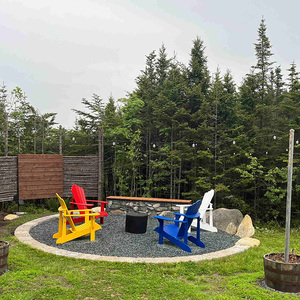We have a lot of country roads hereabouts that are gravel and oil. Some times they’re compacted by road crews, other times they just let the traffic compact. By the dog days of summer, the oil is often perculating up My question is, does anyone know what type of oil they are using?
As I kid I thought I’d heard the old timers say it was recycled automotive oil, but I don’t know if this was correct or not.
jt8
It’s better to light a candle than to curse the darkness. –Chinese proverb



















Replies
always wondered that myself - remember 'Times Beach Missouri'?
http://www.nationmaster.com/encyclopedia/Times-Beach,-Missouri
As I kid I thought I'd heard the old timers say it was recycled automotive oil, but I don't know if this was correct or not.
That's what I was told. It's more like used motor oil than recycled.
Where I grew up they used hot tar sprayed from a heated tanker with spray arms off the back.
Followed up with the chip spreader and a roller.
After a week or so, my dad would send us out with the Wheel Horse and the trailer to scoop up the 'extra' chips that got pushed to the sides before the town did the same.
We had a new driveway every year or so. It was crushed bluestone. That goes for around $100.00 a yd now. Can't imagine they'd still use it.
Eric
I Love A Hand That Meets My Own,
With A Hold That Causes Some Sensation.
[email protected]
limestone chips, $7 a ton retail - been watching the county haul truckloads by the last two days on their way to chip and seal....
"there's enough for everyone"
Hey David,
I hope the trees are blooming or about to; I really enjoyed those peaches at Rhodefest!
Yeah, limestone is cheap and plentiful here also.
I wonder why they used crushed Bluestone? It was probably way cheap back then. A friend of mine just bought 8 yds. and the bill was close to $800.00 delivered.
I haven't been around the old 'hood much lately, I think they've blacktopped the roads by now.
Enjoy the season David.
EricI Love A Hand That Meets My Own,
With A Hold That Causes Some Sensation.
[email protected]
Used crankcase oil..I think the EPA frowns on this practice nowdays.
Whatever they could get for the cheapest price.
Used crankcase oil was a favorite, fortified with the crud left from the refining process (still bottoms I think they called it) -- wasn't good enough to be called tar. Mix it up with some heat and spray away.
Don't think the EPA has a very high opinion of this process anymore.
Jim
Around here they use calcium chloride. Attracts the moisture from the air and binds the dust particles.
Around here they oil some of the dirt roads with something that's very much like molasses. It's very sweet smelling and definitely not motor oil. Keeps the dust down...
Just oil, no gravel?
jt8
It's better to light a candle than to curse the darkness. --Chinese proverb
There are lots of chemicals used to coat roads. The sweet smelling stuff is probably ligno sulphonate., a waste product from paper production, AKA red liquior. There are many petroleum products and many are water borne. If you want to know...call your county road dept and ask them.
I've seen roads in Trinidad & Tobago paved with molasses and egg whites! Still there, 80 years later.
They don't do that anymore. They found out they have oil underneath and the pump that instead.David Thomas Overlooking Cook Inlet in Kenai, Alaska
My Uncle is a road commissioner, and I've helped oil roads a few times. So I know enough to be dangerous I guess.
There are different types of road oil - How many I don't know. I think most of them are oil based. But I don't think they're made from recycled engine oil.
Some bleed in the heat worse than others. I'm thinking my Uncle switched to a road oil called "emulsion" to keep the roads from bleeding so bad. And it seems to have worked well.
There used to be times when it got in the 90s that he'd spend several days putting chips on the hot roads. Now he doesn't have to do it as often.
There are different kinds of rock and chips they use to cover the oil too. Some have less dust in them than others, and are of course more expensive.
I'm thinking that one year they tried using fly ash to cover the roads. But he quit after a while, and I'm not sure why.
That's about the limit of what I know.........
My cousin used to work for a company that oiled roads and I rode along with him as a kid so my knowledge is probably even more dangerous than yours.
I distinctly remember him telling me that a lot of it was used motor oil, but this was in the 1960s - they could have used about anything they wanted then.
As kids we used to ride bikes right behind the trucks as they sprayed the oil - followed by hours of removing oil from our bikes.
Back when I was a kid, they never put rock down. We just weren't allowed to drive on the roads for 3 days after they oiled. I can remember walking through the woods back to the lake, rowing a boat across, then taking the car into town from there. When we knew they'd be oiling roads, we'd find a place to park the car so we could get to town when we had to.Dad also used to have us walk the roads when the oil bled through. We'd take flat bottom shovels, scoop up the loose dust and gravel from the sides of the road, and throw it on the sticky spots. Of course - That was back in the good old days. When we used to walk to school barefoot in the snow, uphill both ways....
Experience is learning a lot of crap you didn't really want to know.
Back when I was a kid, they never put rock down. We just weren't allowed to drive on the roads for 3 days after they oiled.
I can't remember just oil w/o gravel (chips, whatever), but I do remember times when they were dolling out the gravel with an eyedropper, and it was about like there wasn't any. Sounded about like frying bacon when you drove across it. Nasty stuff to get off the car too.
There is probably a civil engineering report somewhere that has done a performance/cost-analysis test between oil/gravel, asphalt, and concrete. If properly put down, I think concrete is probably the best performing surface, however oil/gravel is probably cheaper. And once concrete starts to crack, you might as well give it up when you live in free-thaw-freeze land.
Of course - That was back in the good old days. When we used to walk to school barefoot in the snow, uphill both ways....
And it was 110 degrees in the shade! : )
jt8
It's better to light a candle than to curse the darkness. --Chinese proverb
We just got a bid on our very long driveway. The bid includes two layers of chip over a 2" scratch coat. The "tar" part appears to be an application of .35 gal. "E3M oil" per square yard over
May google searches on E3M oil will help.
According to a report of a recent spill of this stuff, "E3M oil resembles a liquid asphalt and is used to tar and chip roads. Officials say that once cool, it poses no environmental hazard." No precise word on whether it would pose a risk to water if in direct contact.
Around here (NW IA) it's molasses or soybean oil. Some people have it put on their driveways to keep dust down.
Wally
They did our road in tar n stone 2 years ago in prep they said for eventual paving(Rite!) and it beat the old gravel road all to pcs.But 6 mon. later somebody timbered in late winter up here and the haulers just tore it all to h'll.They did something wrong at my coworkers road and the "tar" ran off the road and into his dads pond killin everything.State roads had to build him a new one.
Around here (NW IA) it's molasses or soybean oil. Some people have it put on their driveways to keep dust down.
They getting a shipment from ADM, or can they make it locally? jt8
It's better to light a candle than to curse the darkness. --Chinese proverb